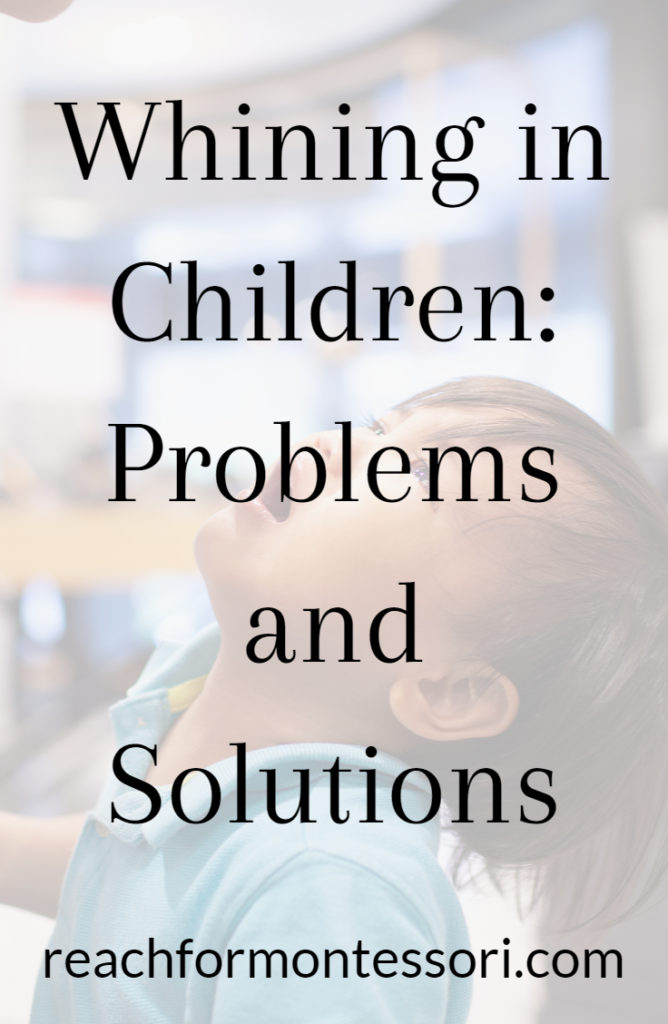There is no more nerve-grating sound for some parents than the sound of their child whining. It can seem like no matter how much love and affection we give our child, they still end up whining for attention.
At times it seems like they are just whining for the sake of whining.
If whining bothers you, you have come to the right place. I see you, and your irritation with this sound is completely valid.
Certain sounds elicit and emotional response from us. It is completely natural.
Let's talk about why kids whine and what we can do about it.

Why do kids whine?
Kids whine for much of the same reason babies cry. They need something and they cannot convey it to us with words.
Even if you have a verbally precocious child, the emotional intelligence it takes to relate their needs and feeling to you may not be present yet.
Physical needs– Hunger, thirst, tiredness, sensory discomfort, etc.
Sadness and Frustration– Many things cause kids to feel sad or frustrated. Having to end an enjoyable activity or share a toy can stir up some intense emotions in kids.
Need for Attention– While children often have the ability to play alone, they crave attention and engagement from their caretakers, as well.
If you consider that many adults have trouble telling each other, “I feel like I need your attention,” it makes sense that children who have yet to develop our vocabulary or emotional intelligence have an extremely hard time expressing this need.
Unable to Express Needs Verbally- Language development is an ongoing process for kids. As mentioned above, whining in kids is akin to crying in babies.
Overstimulation/Boredom– Is the environment too loud or bright? Is their a lack of activities of interest available to your child?
So, while kids are not always specifically whining for attention, they require our attention to help them with their problems.

Whining for attention: solutions
Physical Needs– Recognizing their physical needs is not easy for children, even kids who are able to tell us what they need. Following our child's physical cues is important well into childhood.
If your child is rubbing their eyes and zoning out, a nap or some quiet time may be in order. If they haven't eaten in a couple hours, or if the last meal they ate was not as large as usual, a snack might help with the whining.
Check your child's physical comfort. Could they be too cold or hot? Are they wearing clothing that fits well? Are their shoes too tight? Did they get hurt when you were looking away?
Children can also sometimes be sensitive to sounds and certain physical sensations. If you suspect a sensory issue, it is wise to speak with your child's pediatrician about how occupational therapy might help them.
Sadness and Frustration– The solution to resolving whining from sadness and frustration is helping your child develop emotional intelligence.
Read here for a comprehensive guide to this.
Need for Attention– When every other avenue has been exhausted, it might be clear that your child is genuinely whining for attention; your attention.

The only solution here is to put aside what you are doing, if possible, and engage your child without distraction.
Cuddle time, a special book or game, or involving them in a household activity that needs to be done anyway, can satisfy your child's need for attention.
Unable to Express Needs Verbally–
Some things you can do to help children along with language development are:
1) Listen to audiobooks
2) Engage in activities that encourage language development
3) Read books together
With emotional learning activities and language acquisition assistance alone, you should see some improvement in the amount of whining in your home.
Overstimulation/Boredom– To avoid overstimulation, it can be helpful to avoid exposure to loud situations and bright lights for extended periods of time. This includes having the television or tablet going for long periods in your home.
Limiting screen time has other benefits to your child, as well.
Though it is good for children to experience boredom, it is also important for parents to pay attention to what their children are interested in. Learning about play schemas can be helpful for this.
Setting up an inviting play space for babies/young toddlers and toddlers/older children, as well, can be a helpful boredom buster.
In conclusion, if your child is whining, they are whining for attention and there are things you can do.
Here's to reclaiming your nerves!
Cheers and don't forget to subscribe!
